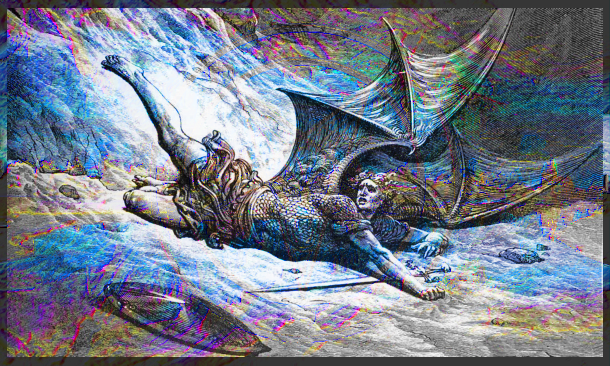One of the best explorations of the origin of Satan in Abrahamic religions is found in The Old and New Testament: Asimov’s Guide to the Bible by Isaac Asimov, published in 1981. This book is one of several that planted the seed of doubt about the validity of the Christian faith. The following is found on pages 408-411.
Only once in the Chronicler’s history does David appear less than ideal and that is in connection with his sin in taking a census. This iterm, however, must be included, for it is central to a theme. It was on the threshing floor where David, according to the legend, had seen the angel that told him the Temple was to be built. Yet, even so, the tale is told with an important difference.
In the pre-Exilic version of the story, it is stated:
And the anger of Jehovah addeth to burn against Israel, and he moveth David about them, saying, `Go, number Israel and Judah.’
2 Samuel 24:1 – Young’s Literal Translation
God alone is here viewed as the source of all things and it is God who inspires David’s evil impulse. By the time of the Chronicler, however, there had come to seem to be a flavor of blasphemy in supposing that God would punish Israel by first inspiring an evil act that he could then use as an excuse for the punishment. As the Chronicler tells the story, then:
And there standeth up an adversary against Israel, and persuadeth David to number Israel,
1 Chronicles 21:1 Young’s Literal Translation
The Hebrew word satan means “adversary”; that is, one who opposes. It does not necessarily have to have a supernatural sense, and is occasionally used in the Bible to represent an ordinary human adversary. The Hebrew word is then translated simply “adversary.”A case of this kind is in the book of 1 Kings, where Rezon of Syria rebels against Solomon:
and he is an adversary to Israel all the days of Solomon, (besides the evil that Hadad <did> ), and he cutteth off in Israel, and reigneth over Aram.
1 Kings 11:25 — Young’s Literal Translation
Sometime after the Babylonian captivity, however, the notion arose that there was a supernatural Adversary; a whose official duty it was to work for man’s evil as God worked for man’s good. This capital-S Satan was without power to force men to do evil, but he could tempt men to sin and turn against God, and it was by succumbing to such temptation that man brought evil into the world.
Such a concept was useful in that it helped explain the source of evil, for it is always difficult to explain the existence of evil and misery in the world and the frequent apparent triumph of bad over good in the face of the existence of an all-powerful, all-good God. Even if one explained that evil came as a punishment to sinning mankind, where came the evil within man that caused him to sin in the first place? Thus the notion of a supernatural Satan pushing man toward sin was convenient.
And the concept, came, very likely, by way of the Persians
By 400 BCE, when the Chronicler was writing, the Persians had become the dominant nation in Asia, and Persian thought would be expected to be very influential among all nations which, like Judah, were under Persian rule. This was particularly so since Persian religion had just been systematized by a great prophet, Zarathustra (Zoroaster, in the Latinized form of the name), at about the time of the return from Babylonian captivity, and the earth rang, so to speak, with the new doctrine.
Zoroastrianism offered a dualistic view of the universe. There was a principle of good, Ahura-Mazda (or Ormuzd), and a principle of evil, Ahriman, which were viewed as virtually independent of each other and very nearly equal. The creation of the world, its development and history, were all incidents in the unending celestial warfare between these two principles, each at the head of a separate army of innumerable spirits.
There is a certain exciting drama to such a view of the universe, and Judaism was penetrated by it to a limited extent. A principle of evil, Satan, was conceived of, but never viewed as independent of God or equal to Him. Instead, Satan is considered to be as surely a creation of God as man himself is.
In later times, he was described as having been an angel originally, even the chief of the angels. Through pride, however, he refused to obey God and bow down to man at the time of the creation of Adam. He was therefore, with numerous followers, ejected from heaven. Once fallen, he became twisted with envy and infinite malice and took on the task of tempting mankind to fall from grace as he himself had.
Satan is not mentioned, as such, in any of the books of the Bible before 1 Chronicles, but the workings of evil found here and there could be reinterpreted in the new light. Most importantly, Satan was equated with the serpent who tempted Even in the garden of Eden.
The tale of Satan, of his rebellion against God, and of his fall from heaven, forms the central framework of Milton’s great epic poem Paradise Lost, which is based on the first chapters of Genesis.
Furthermore, Satan does not perform his evil task without remaining under the firm control of God. It is even possible to view Satan as fulfilling the necessary function of tempting mankind and of improving the nature of the soul by exercising it, so to speak; keeping it muscular by giving it temptations to overcome. Satan might then, too, act as a sieve separating the better souls from the worse.
It was part of Satan’s function to carry an evil report of man to God, to slander them. (This shows itself best in the Book of Job.) The Greek word for “slanderer” is diabolos (literally “to throw across,” block progress) and from this comes our word “devil” and the adjective “diabolical.” The word “devil” is used in places in the King James Version to refer to woodland fertility spirits, which are called “satyrs” in the Revised Standard Version (see Leviticus 17:7), but the capital-D Devil is Satan. Satan, the adversary, is also the Devil, the Slanderer. The Mohammedans* call the Adversary Eblis, also from diabolos.
In Zoroastrianism, the powers of evil who fight under the banner of Ahriman are the “devas,” but this has nothing to do with “devil.” Quite the contrary! The same word occurs in Sanskrit and is given to the dogs and the spirits of good in India.
This is not really surprising for the gods of one people are the demons of their neighbors. Undoubtedly, Indian religious thought was penetrating Persia in Zarathustra’s time and in beating it back, the Persians stigmatized the alien gods as demons–as the Jews considered Canaanite gods to be abominations, and as the Christians later converted the Greek and Roman gods into evil spirits.
The word “deva” reaches us not through Persian but through Sanskrit and therefore retains its godlike aspect. From it we get the Greek dios, the Latin deus, and the French dieu, all meaning “God.”



Leave a Reply